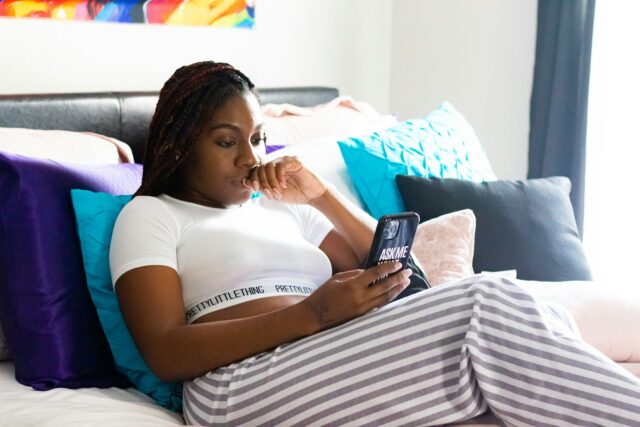When you’re naturally introverted, even friendly outgoing habits can feel incredibly overwhelming sometimes.

You don’t hate people or dislike socialising. It’s just that energy, space, and the way certain social norms can quietly drain you, and that’s tough to cope with. The tricky thing is, a lot of extroverted behaviours are meant with good intentions, which makes it even harder to explain why they don’t always feel good. These are some of the most intense habits more socially minded people have that tend to take the most out of introverts.
1. Constant small talk with no real connection

Small talk is fine in tiny doses, but for introverts, endless surface-level chatting can feel exhausting fast. It takes energy without offering much meaningful connection in return. They’re not trying to hide or anything. It’s just that their brains crave deeper conversations or meaningful silence over swapping weather updates for the fifth time. Energy spent on small talk often feels wasted instead of energising.
2. Being pulled into big group conversations

Large group discussions can feel chaotic and hard to follow, especially when everyone’s talking over each other. For introverts, it’s easy to feel drowned out or invisible in those moments, no matter how friendly the group is. It’s not about shyness; it’s about sensory overload and the mental juggling act it takes to track multiple voices and social cues all at once. One-on-one conversations usually feel way calmer and easier to connect through.
3. Being expected to “mingle” at parties

The whole idea of “working the room” feels overwhelming to a lot of introverts. Being told to bounce from group to group, making small talk with strangers, can feel like emotional whiplash. Introverts usually prefer settling into one meaningful conversation rather than scattering themselves thin across dozens of shallow ones. Mingle culture often feels like performance, not real connection.
4. Loud, high-energy greetings

Big hugs, booming hellos, excited squeals—they’re all meant with love, but sometimes they hit introverts like a wall of noise and pressure they didn’t have time to brace for. They do love seeing their friends, family, and those they care about. It’s just that sudden, intense social energy can feel physically overwhelming, especially if they weren’t expecting it. A calm hello goes a lot further sometimes.
5. Being put on the spot in conversations

Some outgoing people love throwing out spontaneous questions or challenges to liven up the room, but introverts usually need a little more time to gather their thoughts before jumping into the spotlight. Feeling cornered into sharing a story, answering a big question, or leading a group conversation without warning can trigger instant brain fog. They often have great things to say; they just appreciate a heads-up first.
6. Nonstop invitations with little breathing room
 Source: Unsplash
Source: Unsplash It’s sweet to be included, but getting invited to events back-to-back with little time to decompress can feel like a slow emotional drain for introverts. They need space to recharge, not constant momentum. Sometimes they genuinely want to come, but they also need time to be still, quiet, and alone to feel like themselves again. Without that balance, even fun plans start to feel like pressure.
7. Being expected to answer texts immediately
 Source: Unsplash
Source: Unsplash Quick, constant texting is second nature for a lot of outgoing people. However, for introverts, having to stay in constant conversation, even digitally, can feel quietly stressful. It’s not about being cold or distant. Sometimes they just need mental space between interactions. Delayed responses don’t mean they care less — they’re just pacing themselves so they don’t burn out.
8. Group games that force attention on them
 Source: Unsplash
Source: Unsplash Games like charades, karaoke, or anything that requires centre-stage participation can make introverts feel exposed and uncomfortable fast, even if everyone else is laughing and having fun. It’s not about lacking a sense of humour; it’s about feeling shoved under a spotlight they didn’t ask for. They’re often much happier cheering other people on than being the show themselves.
9. Unexpected drop-ins or surprise visits
 Source: Unsplash
Source: Unsplash Outgoing folks might think a spontaneous visit is a fun surprise, but for introverts, it can feel jarring and stressful, like they suddenly have to perform when they were mid-recharge. They’re not trying to be inhospitable. They just need a little mental prep time before switching into social mode. A heads-up gives them a chance to show up fully, not halfway hiding behind the couch.
10. Being dragged into group photos

Group photos can feel overwhelming for introverts because they often involve performing happiness for the camera, sometimes over and over again until everyone gets the perfect shot. They want memories like everyone else, of course; they just prefer candid, genuine moments over staged ones. Being forced into big photo ops can make them feel weirdly disconnected from the experience itself.
11. Being mistaken for shy when they’re just quiet

Outgoing people sometimes interpret introvert quietness as nervousness or insecurity, and they try to fix it by drawing them out or putting them on the spot. It usually backfires. Most introverts aren’t sitting there wishing they were louder. They’re observing, processing, and choosing their moments carefully. Respecting that quiet can feel way more welcoming than trying to pull them into the spotlight.
12. Loud, fast-paced environments with no escape

Busy parties, loud concerts, crowded restaurants—they can be fun in small doses, but if there’s no quiet corner to retreat to, introverts start to wilt fast. Having somewhere to catch their breath makes all the difference. Without an escape hatch, they often feel trapped in overstimulation mode, counting the minutes until they can finally breathe again.
13. Being expected to match everyone else’s energy

When everyone’s loud, laughing, and buzzing around, introverts can sometimes feel pressured to crank up their own energy to fit in, even when it’s not how they naturally feel. Faking high-energy enthusiasm takes a toll over time. They often connect much better when allowed to show up as they are, instead of squeezing themselves into an outgoing mould just to keep the vibe alive.
14. Feeling like saying no will hurt someone’s feelings

One of the hardest parts for introverts is feeling guilty about needing alone time when outgoing friends see connection as constant contact. Saying no can feel like risking the relationship, even when it’s just about needing to recharge. The truth is, boundaries make relationships stronger, but getting there takes trust on both sides. Introverts aren’t rejecting people; they’re protecting the energy that lets them show up fully next time.




